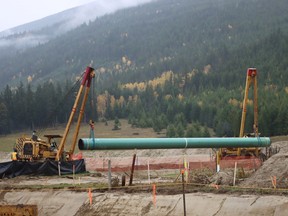
Article content
As the Trans Mountain Pipeline expansion project readies for operation next month, it is Canada’s moment to celebrate and reflect. This is one of the most complex and contentious energy projects in our history, that mattered too much not to finish.
When TMX was first announced in 2012, no one could have predicted so many forces would conspire against it. It was like Murphy’s Law magnified. COVID, labour shortages, global supply chain issues, blockades and protests. Add to that wildfires, flooding and legal action, all of which delayed construction and raised questions about whether the project should even proceed.
Advertisement 2
Article content
Article content
Times were very different in the 1950s when construction of the original Trans Mountain pipeline began. This key transportation link between the Alberta oilsands to terminals in B.C. and Washington state took just over 30 months to complete. There was no drama. None of the nasty political infighting that nearly killed the expansion project, despite its clear economic benefits. And there are many.
Twinning the existing 1,150-kilometre pipeline between the Edmonton area and Burnaby allows the system to nearly triple its capacity to 890,000 barrels per day. It opens new markets for Canada’s oil, providing energy security and generating billions in additional revenue for all three levels of government. And all along the pipeline route, this project has created tens of thousands of jobs, supported local communities, promoted new and lasting partnerships, and provided opportunities to train new workers.
Still, former B.C. premier John Horgan threatened to use “every tool in our tool box” to stop the project, including a series of legal challenges. Next door, Alberta’s then-premier Rachel Notley said the expansion project was in Alberta and Canada’s best interests and must move forward. The two NDP premiers were locked in a nasty public battle.
Article content
Advertisement 3
Article content
When this provincial infighting proved too much for the project owner, Kinder Morgan, the federal government did something few expected. It stepped up and purchased the pipeline expansion project in 2018. After a seven-month review, the government approved the project, subject to 156 conditions.
We have to give Prime Minister Justin Trudeau’s government credit for recognizing the pipeline’s value. “Access to world markets for Canadian resources is a core national interest. The Trans Mountain expansion will be built,” Trudeau proclaimed. And he was right. Although it’s taken years, and a roller-coaster ride to get here.
To date, roughly 35,000 people have worked on the expansion project. The Progressive Contractors Association of Canada (PCA) is proud of its member companies and their workers who helped get this project over the finish line. They truly are the industry rock stars who were able to achieve great feats in engineering and construction mastery to move the pipeline around communities and through the diverse terrain of mountainous regions and waterways. They are the same people who stuck with this project through years of project suspensions and uncertainty.
Advertisement 4
Article content
The day has finally come for the Trans Mountain Expansion project to do what it was built for. It has undergone the most rigorous design, consultation and environmental approvals process in Canadian regulatory history. It has met every requirement, and now there’s nothing left to fight about.
As Canadians, we hail from a resource-based country. It’s what we are, and what we do responsibly. Building critical energy projects, including pipelines, should never be this hard.
Completion of the Trans Mountain Pipeline expansion project is a proud moment.
Let’s celebrate it, and give this milestone project a chance to prove its worth.
Paul de Jong is president and CEO of the Progressive Contractors Association of Canada (PCA).
Article content



